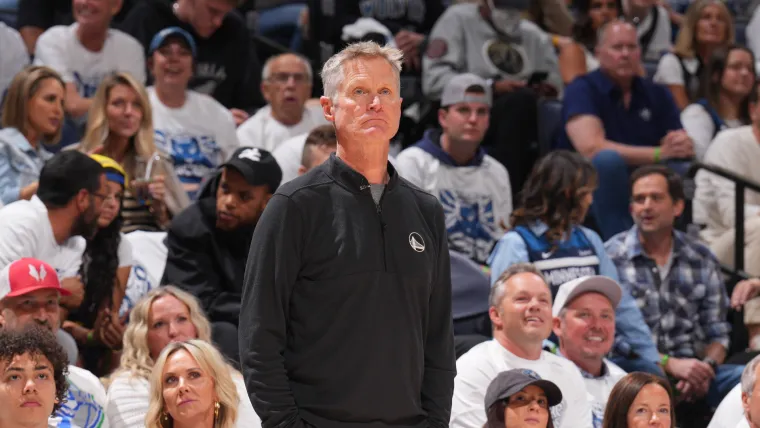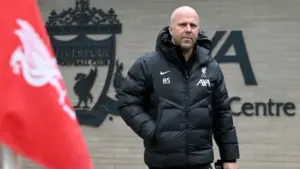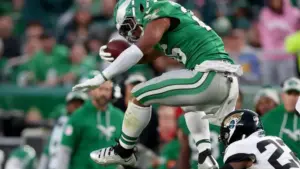Former Chicago Bulls reserve guard Steve Kerr recently offered a piping hot take about eventual Hall of Fame teammate Michael Jordan’s first retirement.
The 6-foot-6 North Carolina swingman was exhausted after three consecutive NBA championships and an Olympic gold medal, and utterly devastated by the news of his father’s July 31 murder.
On October 6, 1993, just ahead of the 1993-94 and what would have been his third straight title defense season, Jordan announced his initial retirement from basketball at age 30.
In February 1994, Jordan embarked on a surprise baseball career, playing for the Birmingham Barons, a minor league affiliate of Bulls owner Jerry Reinsdorf’s other pro team, the Chicago White Sox.
When the MLB went on strike ahead of spring training in 1995, Jordan hung up his cleats rather than risk being called up as a replacement scab, rejoining Chicago late into its 1994-95 season and capping what was essentially an 18-month sabbatical.
MORE NEWS: Bulls given surprise grade for under-the-radar summer move
Jordan was rejoining a Chicago team that, was almost entirely different from the Bulls’ three championship squads.
One of the new faces who would have a huge impact in the years to come was Kerr, a sharpshooting reserve guard who wound up playing big minutes during Jordan’s retirement, in a depleted Chicago backcourt.
During a recent interview for the “Glue Guy Podcast,” Kerr explained the strange dichotomy. In the summer of 1993, he had signed on to play for a Bulls team led by Jordan and fellow Hall of Famer Scottie Pippen, at the time coming off three straight titles.
But by the time training camp opened, Jordan was gone — and Kerr soon found himself in a more critical role than he had perhaps anticipated, although the more defensively-inclined Pete Meyers earned the starting two-guard spot over Kerr.
“So, it actually was to my benefit in some ways that he went because it opened up a bunch of playing time,” Kerr said. “It was bad for the rest of the Bulls and their fan base, but it was good for me.”
Prior to his Bulls revival, the 6-foot-1 Arizona product had appeared to be on his way out of the league, having averaged just 2.5 points a game in single-digit minutes across each of his two prior seasons with the Cleveland Cavaliers and Orlando Magic.
During his first year in Chicago, Kerr enjoyed the most prolific season of his career as a scorer, averaging career highs of 8.6 points (on .497/.419/.856 shooting splits), 1.6 rebounds, and 0.9 steals, plus 2.6 assists, in a career-most 24.8 minutes a game. He would go on to play 10 more seasons in the league, winning five championships with the Bulls and San Antonio Spurs.
Sans Jordan in 1993-94, Pippen thrived most of all, finishing third in MVP voting while leading the Bulls to a surprise 55-27 record. Chicago lost a controversial seven-game second-round playoff series to the New York Knicks, the team’s longtime nemesis in the Eastern Conference.
The next year, though, with All-Stars Horace Grant and BJ Armstrong both gone, the Bulls initially fell back to earth a bit. Jordan’s return down the home stretch did reinvigorate the club. Kerr set a league record for 3-point shooting efficiency during that 1994-95 season, connecting on 52.4 percent of his triple tries.
“And then, of course, Michael came back two years later and we started winning, you know, winning again. So it was, you know, what I learned was it’s a lot easier to develop a role, on a great team with great players than on an average team, you know, where everybody’s just kind of confused as to, you know, who’s the man and all that stuff,” Kerr added. “The hierarchy in Chicago allowed me, and the offense allowed me to just plug right in.”
Even with Jordan back in the fold, Chicago was again ousted in the second round by the bigger, younger Orlando Magic. Ex-Bulls All-Star Horace Grant played a major role in that six-game series defeat.
The Bulls knew they needed frontcourt help — a physical, defensive presence to replace what they had lost when Grant defected for Orlando as a free agent in 1994. So in the summer of 1995, Chicago signed an aging Spurs castoff many suspected was too much of a head case to offer much help — Dennis Rodman.
And the rest, as they say, is history. Rodman, Jordan, Pippen, and guard Ron Harper cultivated one of the most vicious NBA perimeter defenses ever, en route to three straight championships from 1996-98. Jordan won MVP awards in 1996 and ’98. Jordan, Pippen and Rodman became the rare teammate triumvirate to all make the All-Defensive First Team in the same season.
Jordan and Pippen were both honored with All-NBA appearances. Future Hall of Fame reserve forward Toni Kukoc was named the 1996 Sixth Man of the Year. Chicago submitted what at the time were the winningest and second-winningest regular seasons ever (the Kerr-coached Warriors would surpass the Bulls’ 72-10 record by a single game, going 73-9, but unlike Chicago, gave up a 3-1 series lead to lose the NBA Finals).
You know, dynasty stuff.
MORE NEWS: Stunning amount of Bulls fans ‘satisfied’ with team’s terrible recent play






